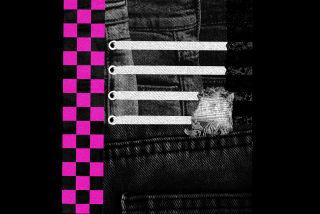Donning Scarves in Solidarity
- Share via
It was intended as a simple gesture of solidarity with Muslim women who have become an easy target for our nation’s anger these days: What if women from every race, religion and nationality went about their daily routines with their heads covered in the traditional scarves that many Muslim women wear?
But when Washington, D.C., student Jennifer Schock posted her idea on the message board of a women’s media group, she was stunned by the firestorm of controversy it generated.
“Some people said the idea was ridiculous, that I should be finding more constructive ways of spending my time,” said Schock, 31. Others criticized her for embracing a tradition that is viewed by many as a symbol of Islam’s oppression of women.
“It was supposed to be this very simple way ... to reach out to Muslim women, to tell them, ‘You don’t have to be alone.’ No rally, no vigil, nothing political about it,” she said. “Just a way to challenge our perceptions and foster some kind of dialogue with the people we encounter in our everyday lives.
“Instead, all of a sudden, I’m endorsing the oppression of women. It made me realize just how emotional this whole thing is.”
While “Arab-looking” men are being profiled as possible terrorists, Muslim women in traditional dress have also felt the heat of a suspicious nation.
“I have talked to so many women who are afraid, who have not been out of their homes because they don’t feel safe,” says Khalid Iqbal of the national Council on American Islamic Relations in Washington, D.C.
Amid news accounts of sporadic violence aimed at Muslims, fears abound. Reports have come in from mosques and Muslim organizations across the country, including in Los Angeles, of women being harassed, having their scarves yanked from their heads, he said. “Some sisters have heard that at some colleges and schools, young people have tried to light the tips of the scarves with a match, to set them on fire.”
The scarves, called hijab , are worn by many girls once they pass puberty, as part of Islam’s dictates requiring women to dress modestly. Not all Muslim women wear them; it is not explicitly required by the Koran, and some say there has been a misplaced emphasis on the scarf as a marker of personal piety and religious devotion.
The hijab is worn wrapped around the head to cover all the hair, and tied under the chin, with a corner hanging down the back. Women wearing the hijab must adhere to other rules of modesty, such as keeping their arms and legs covered in public.
“The West looks at the scarf as a sign that Muslim women are oppressed,” Iqbal said. “But Muslim women see it as a sign of dignity that shows respect for their religion and elicits respect from men.”
But in the aftermath of the terrorist attacks, the hijab has also become associated with the notion of terrorism in the eyes of some angry Americans. “We have had to suggest that women don’t go out at night, that they stay in safe, public places and have a cell phone ready to call for help,” Iqbal said. And he recommends that women change the way they secure the hijab --”maybe with a pin that will break loose when pulled, rather than a knot”--because some women have been injured when strangers yanked on their scarves. “One woman was literally dragged” and almost strangled when someone tried to pull off her scarf, Iqbal said.
Schock consulted Iqbal and visited several Washington-area mosques before proposing her solidarity campaign. “I didn’t want to insult anyone, or make their lives any more difficult than they already are,” she said. Iqbal--who has been on the front lines of efforts to calm American attitudes toward Muslims since the attacks--said he was moved to tears by her idea. “Such good wishes ....What can I say? I usually don’t get emotional, but I did in this case. It is such a beautiful thing.”
And Schock says she has been moved by the expressions of gratitude she has received from Muslim women who learned of her campaign. “I’ve gotten so many calls saying, ‘Thank you, thank you.’ It’s such a little thing, but they have been so grateful.”
Schock has no idea how many women have taken part in her campaign. She heard from about 50 women--mostly in the Washington, D.C., area--who said they planned to don scarves for a day. And calls and e-mails are coming in from women in other parts of the nation who are trying to organize similar efforts through their churches, community groups, even PTAs.
Schock wore her scarf for one day last week, and though she felt self-conscious about her appearance, no one she encountered was unkind. “I took the train in [from Fairfax, Va.] to D.C. and it was packed, and a lot of people seemed to go out of their way to be nice.”
Administrators at the college she attends--presuming that she was Muslim--approached her to thank her for having the courage to come to class. “Someone on the train asked if I spoke Arabic. And one person asked me what Jewish holiday it is.”
And if the sight of a fair-skinned woman in Muslim dress confused and challenged some, the experience changed Schock as well. She grew up in a Missouri town so small that it has only one-third as many residents as the number of people who died in the World Trade Center. “Growing up, I didn’t know anyone who wasn’t white and European, until I went off to college.”
This experience, she says, “opened my eyes to what it feels like to be different, to feel out of place in your own country.”
Sandy Banks’ column runs on Tuesdays and Sundays. Her e-mail address is sandy.banks@latimes.com.
More to Read
Sign up for Essential California
The most important California stories and recommendations in your inbox every morning.
You may occasionally receive promotional content from the Los Angeles Times.













